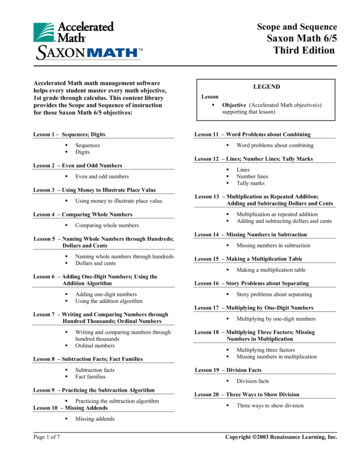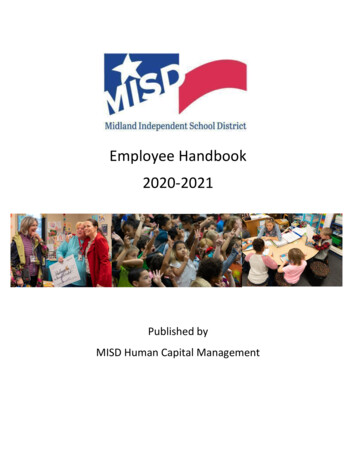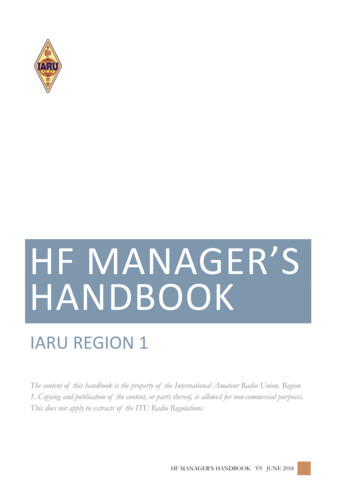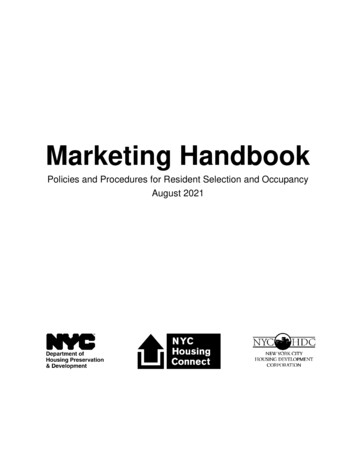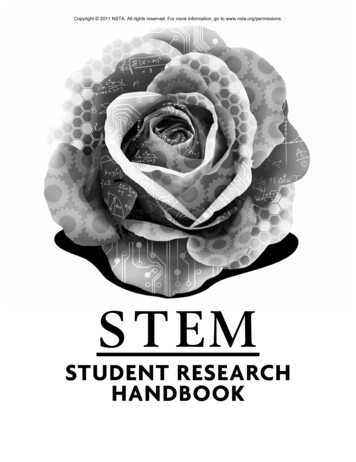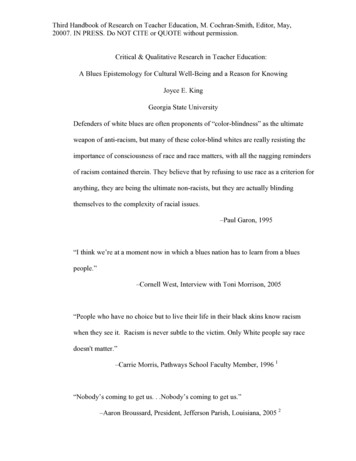
Transcription
Third Handbook of Research on Teacher Education, M. Cochran-Smith, Editor, May,20007. IN PRESS. Do NOT CITE or QUOTE without permission.Critical & Qualitative Research in Teacher Education:A Blues Epistemology for Cultural Well-Being and a Reason for KnowingJoyce E. KingGeorgia State UniversityDefenders of white blues are often proponents of “color-blindness” as the ultimateweapon of anti-racism, but many of these color-blind whites are really resisting theimportance of consciousness of race and race matters, with all the nagging remindersof racism contained therein. They believe that by refusing to use race as a criterion foranything, they are being the ultimate non-racists, but they are actually blindingthemselves to the complexity of racial issues.–Paul Garon, 1995“I think we’re at a moment now in which a blues nation has to learn from a bluespeople.”–Cornell West, Interview with Toni Morrison, 2005“People who have no choice but to live their life in their black skins know racismwhen they see it. Racism is never subtle to the victim. Only White people say racedoesn't matter.”–Carrie Morris, Pathways School Faculty Member, 1996 1“Nobody’s coming to get us. . .Nobody’s coming to get us.”–Aaron Broussard, President, Jefferson Parish, Louisiana, 2005 21
Third Handbook of Research on Teacher Education, M. Cochran-Smith, Editor, May,20007. IN PRESS. Do NOT CITE or QUOTE without permission.But can you expect teachers to revolutionize the social order for the good of thecommunity? Indeed, we must expect this very thing. The educational system of acountry is worthless unless it accomplishes this very task.–Carter G. Woodson, 1933/1977 3IntroductionA growing body of teacher education research documents the fact that manyexperienced and future teachers resist a critically transformative understanding of race andracial inequity. This resistance, which can be understood as a result of mis-education, is anongoing challenge for the profession and for teacher education research. Emergent inquirybased pedagogical approaches that use the knowledge traditions and lived experiences ofmarginalized and oppressed groups in teacher learning (and un-learning racism) withcommunity members suggest possible ways out of this knowledge crisis. However, researchon teacher education has yet to address the belief structure of race in ideologically biasedschool/academic knowledge and research that contributes to the mis-education of teachers,although a tradition of Black scholarship has long recognized this epistemological problem(McDaniels, 2006).Writing nearly a century ago in 1917, for example, Black sociologist, lawyer, andhistorian, George Washington Ellis, pinpointed the hegemonic role of ideological knowledgein maintaining the mythology of race and perpetuating racial injustice. For Ellis “scholarlyactivity had to be moved from the ideological position of racism to the ideological position ofdemocracy” for the benefit of the entire society (Childs, 1989, p. 87). A few years later, theresearch of another Black historian, educator, and activist scholar, Carter G. Woodson, whofounded “Black History Week/Month” in 1927, showed how ideological school knowledge2
Third Handbook of Research on Teacher Education, M. Cochran-Smith, Editor, May,20007. IN PRESS. Do NOT CITE or QUOTE without permission.obstructs democratic community in the U.S. His analysis of mis-education, that is, howideologically biased school knowledge systematically teaches whites to feel superior andBlack people to feel inferior, led Woodson (1933) to call for teachers to “revolutionize thesocial order”.The integrity of Black culture, including its African roots, was fundamental in thesescholarly challenges that Ellis, Woodson, and others have launched to combat the hegemonyof ideologically biased knowledge (Gleason, 2006; King, 1992,1995). Scholarly defense ofBlack culture and heritage has been necessary, not solely to set the historical record straighton behalf of African Americans, but also as an investment in human freedom fromdehumanizing supremacist ideologies. The “convergence of critical thought and action”(King, 2004, p. 351) and the inextricable connection between the general welfare ofhumanity and Black people’s cultural well-being are defining qualities of this Blackintellectual tradition that have been carried forward in the modern discipline of Black Studies(B. Gordon, 1990, 1995). A Black Studies theoretical analysis is employed in this chapter toconsider how (and how well) critical and qualitative research (and practice) in teachereducation produces knowledge, understanding, and social action for racial-social justice. Thishyphenated term is used in order not to lose sight of Black people’s group survival needs,that is, the “requirements for black existence,” in transformative visions of equity anddemocratic inclusion (Cone, 1972, p. 27).Focus of the chapter. This chapter focuses on four inter-related genres of critical andqualitative research in teacher education with racial-social justice aims: 1) critical racetheorizing, 2) whiteness studies, 3) critical ethnography, and 4) practitioner inquiry,including action research “in, on, and for” teacher education (Cochran-Smith & Lytle, 2004).3
Third Handbook of Research on Teacher Education, M. Cochran-Smith, Editor, May,20007. IN PRESS. Do NOT CITE or QUOTE without permission.The Black Studies theoretical analysis that informs the discussion of these modes ofinquiry focuses analytical attention on the belief structure of race in ideologically biasedknowledge in schools and academe and epistemologies and indigenous knowledge traditionsfrom the ideological position of democracy. One example, the epistemology of the Blackexperience embodied in the African American blues tradition, will be used as a heuristicframework to suggest cultural well-being as a measure of what/how these modes of researchcan contribute to equity and democratic inclusion in education and society. It will be arguedthat a crisis of knowledge in teacher education research (and practice) exists because of theabsence of marginalized and oppressed people’s epistemologies as a foundation ofknowledge for teacher learning and for teaching. Thus, the discussion of these genres ofresearch goes beyond a focus only on the mis-education of teachers. Rather, the emphasisalso is on producing knowledge for the benefit of marginalized communities and the generalsociety’s welfare. Several overlapping questions will illuminate this missing cultural wellbeing framework: 1) What/whose social vision does research honor and project? 2) Is thecultural well-being of marginalized groups a consideration? 3) What is missing in the theoryand methods of these genres of inquiry, given these group survival needs, that is, the“requirements of black existence,” for example? 4) Can research informed by the bluesepistemology of the Black experience advance understanding of the interconnections amongBlack people’s cultural well-being, positive inter-group relations, and humanity’s generalwelfare?Organization of the chapter. The chapter is divided into four parts. The first part,“Epistemologies and Knowledge Traditions for Cultural Well-Being,” introduces the BlackStudies analysis of the ideology of race and the blues epistemology of the Black experience.4
Third Handbook of Research on Teacher Education, M. Cochran-Smith, Editor, May,20007. IN PRESS. Do NOT CITE or QUOTE without permission.“Decolonizing” methodology and theory articulated and used by indigenous peoplesthat complement the blues epistemology are also presented. The second part of the chapter,“From Critical Social Theories/Theorizing to Critical Research Methods,” briefly reviews thegenealogy of critical theory and methods in the social sciences and teacher education. Theresearch examples discussed illustrate various critical methods, including critical race theory,critical ethnography, as well as investigations of the discourse of “whiteness,” and feministresearch approaches. The third section of the chapter, “A Continuum of Practitioner Inquiry:Learning to Teach for Social Change,” examines the use of various qualitative researchmethods in teacher education research--from individual narratives to ethnography to actionresearch in community settings. The final section, “Beyond the Crisis of Knowledge inTeacher Education Research and Practice,” presents teacher education methods thatincorporate community knowledge and new roles for community members that supportmutually beneficial teacher learning and development.Epistemologies and Knowledge Traditions for Cultural Well-BeingIn spite of a burgeoning body of multicultural education literature (Banks & Banks,2004; Goodwin & Swartz, 2004; McAllister & Irvine, 2000), teacher education research hasproduced no accepted consensus about what teachers should “know, be able to do and belike” to promote and safeguard the cultural well-being, sense of belonging, and agency ofAfrican American learners (King, 1994; Lee, 2001) or other marginalized students. Murrell(2001) offers this cogent description of “capable” urban teachers who:. . .must be aware that there is a deep and profound violence embedded in the fabricof American popular and institutional culture that is a significant and toxic part of5
Third Handbook of Research on Teacher Education, M. Cochran-Smith, Editor, May,20007. IN PRESS. Do NOT CITE or QUOTE without permission.children’s school experience. Where there is not an anti-racist awareness and explicitpedagogy for working with African American children and families, there persists aninsidious violence that even the most well-meaning teacher will be a participant indespite beliefs and values to the contrary. (p. 75)In this vein S. King and Castenell (2001) assert: “the task of fighting racism has to be thebottom line” if educational institutions are going to prepare “teachers with the will and thestrategies to teach all children” (p. 10). Assaults on “blackness as a cultural reality,” as in thefollowing example, is one form that racism takes (Murrell (1997, p. 33). A student teacherrelated in one of my courses how a white teacher at an award-winning elementary schooldescribed the Black children in her classroom. The teacher said that there were two groups ofBlack children in her assigned classroom: the “black-Blacks” and the “white-Blacks.” Theteacher informed her that attempting to teach the “black-Blacks” would be a waste of timebecause they have “black values.” Teaching the “white-Blacks,” on the other hand, who have“white values,” would be worthwhile.4 The student was shocked and chagrined because shewas among those credential candidates who had resisted the focus on racial inequity in therequired cross-cultural communications course.Knowledge for Cultural Well-being: A Task for ResearchTo combat such beliefs Murrell (2001) calls for a pedagogy “grounded in the history,traditions, and cultural heritage of African Americans” (p. 33). However, this will require rewriting academic and school knowledge (Loewen, 1995; Stevens, 2005; Wynter, 2006).Following are three examples of ideologically biased academic/school knowledge, includingmisrepresentations of slavery in textbooks and classroom discourse that contribute to the miseducation of teachers and assaults on cultural blackness. First, an ethnographic investigation6
Third Handbook of Research on Teacher Education, M. Cochran-Smith, Editor, May,20007. IN PRESS. Do NOT CITE or QUOTE without permission.in predominately white suburban middle school classrooms reveals the limits of thewhite teachers’ knowledge and pedagogical skills regarding teaching about the enslavementof African people and the heritage of Native Americans. Classroom discourse rendersAfrican Americans “present in the curriculum” but only as slaves, and, thus, “absent inhistory” (Wills, Lintz, & Mehan, 2004, p. 107).Second, in my work with teachers I ask if anyone can name the three universities thatexisted in West Africa before Columbus arrived in the Americas (Gao, D’jenné, and Sankoréat Timbuktu in present-day Mali). Nearly always the response is: “No.” Kincheloe (2004)reports a similar experience when he asks whether teachers have studied “the story of theEuropean colonization of Africa and the effects of the slave trade” (p. 1). In fact, thestructure of knowledge in the discipline that separates African history from American historycircumscribes what teachers (and their students) can learn about Africa, slavery, and thedevelopment of U.S. society. Teachers learn little if anything concerning the vital role notjust of African labor but also the sophisticated knowledge and skills African peoplepossessed that made the nation’s development and wealth possible (Carney, 2001).Fragmentation of historical knowledge thus obstructs the critical understanding teachers needto explain African descent people’s continuing impoverishment given the nature and functionof global capitalism—then and now (Maiga, 2005). The devastation of urban communitiesthat has undermined traditional African American culture, community viability, andbeneficial socialization practices--conditions that are portrayed as a “culture of poverty” andas culturally deficient “black-values” (Heath, 1989; King & Wilson, 1994).A third example is the way “dysconsciousness,” the term I introduced to describesuch “limited and distorted understandings” of racial inequity, is used in multicultural teacher7
Third Handbook of Research on Teacher Education, M. Cochran-Smith, Editor, May,20007. IN PRESS. Do NOT CITE or QUOTE without permission.education and critical race scholarship (King, 1991a). Though it is often cited indiscussions of racism, none of these publications reference the key finding of the originalstudy of dysconsciousness: pre-service teachers typically explained racial inequality “as ahistorically inevitable consequence of slavery or as a result of prejudice and discrimination”(King, 1991a, p. 138), which they also linked to slavery. None of their explanations showedany recognition of the systemic nature of racism (Duncan, 2004) or the “structuralunderpinnings of inequity” (Cochran-Smith et al., 2005, p. 956).Generating forms of knowledge and effective pedagogy that teachers need to addresssuch ideological constructions of race is a task for teacher education research. As Hilliard(2001) cautions, however, researchers have unfortunately been “following the detour of racerather than the ideology that propels it” (p. 2). In a Black Studies analysis of the ideologicalbelief structure of race Wynter (2003, 2006) argues that racism is a logical outcome, an effectof “law-like” societal cultural rules and ideas that govern our behaviors and shape ourperceptions of reality (King, 2005b). This system of knowledge and representation defines“conceptual blackness” as the “alter ego” of “conceptual whiteness” (Wynter, 2003).Although “whiteness” studies have begun to proliferate, this understanding of what “race”does and which grasps the epistemic roots of assaults on cultural blackness, is undertheorized in education (Bush, 2004; Ignatiev, 1994; Jensen, 2005; Kent, 1972; Prager, 1982;Roediger, 1998).The Blues Epistemology of the Black ExperienceThe task of fighting racism, then, entails the production of knowledge to combat thissystem of representation. It seems reasonable to expect that such research would benefit fromthe inclusion of epistemologies of marginalized peoples. Researchers of color recognize the8
Third Handbook of Research on Teacher Education, M. Cochran-Smith, Editor, May,20007. IN PRESS. Do NOT CITE or QUOTE without permission.intimate connection between epistemology and methodology when justice is theobjective (Bernal, 1998; Pizarro, 1998). The African American blues tradition, discussednext, offers such an epistemological vantage point from which to document, interrogate, andtransmit knowledge of the existential Black experience. This discussion is intended toilluminate four key characteristics of the blues epistemology that: a) embraces thecontradictions in the Black struggle for being; b) functions as a unifying impetus forcommunity building; and c) provides clarifying social explanation, political knowledge, andspiritual understanding that is not solely for race consciousness but also d) to connect Blacksuffering with the universal ideal of the human spirit of freedom. The following historicaloverview presents the rich, underutilized potential of this epistemology for teacher learningand research about and also through African American cultural perspectives.Critical social explanation/theorizing. McLaren and Farahmandpur (2001) definetheory as a “living aperture through which specific histories are made visible and intelligible”(p. 301, cf. Grande, 2004, p. 28). The blues tradition constitutes a form of critical Blackworking class theorizing or social explanation. Woods (1998) argues that the bluesconstitutes an epistemology of African American thought that embodies “African Americandaily life, social explanation, [and] social action,” that is, “how to act,” solve problems, andbehave (p. 101). Blues lyrics, which typically address themes of love and mistreatment, haveoften been misinterpreted as a “music of resignation.” On the contrary, as Titon (1990)posits, the core of the blues is about “freedom from mistreatment, not submission to it” (p. 2).Whereas Black people have been subjected to unspeakable dehumanization, the bluesresponse is love.9
Third Handbook of Research on Teacher Education, M. Cochran-Smith, Editor, May,20007. IN PRESS. Do NOT CITE or QUOTE without permission.The record of African American cultural resilience and critical social thoughtconveyed in the blues contrasts with the culture of poverty deficit “theories” of Black life andculture that emerged in the social sciences in the U.S. around the same time that the bluesmoved along with Black people from rural areas of the Mississippi Delta to the urban north.Woods provides this illuminating account of the emergence of the blues tradition of “culturaltransmission and social explanation”:Emerging out of the rich tradition of African song-centered orature, and underconditions of intense censorship, secular and sacred songs became fountainheads ofcultural transmission and social explanation. Furthermore, as a result of the extremelyhierarchical class structure of Southern plantations, African-American working classthought would come to find its fullest expression in the blues: a “collectiveexpression of the ideology and character of Black people situated at the bottom of thesocial order in America.” (Woods, 1998, p. 56, cf., Barlow, 1989, p. xii)Black Studies scholarship recognizes in the “historic commitment to social and personalinvestigation, description and criticism present in the blues” a resource for critical knowledgeand a source of theory (Woods, 1998, p. 30). In one program teacher educators and futureteachers have studied blues culture, history, lyrics, and the lives of blues performers asaesthetics education (Asher, Fairbank, & Love, 2006; Love, 2006). Considering thesubjugated knowledge traditions of Black people (or any other marginalized cultural group)as an epistemological resource for pedagogy, theory, or methodology in research, however,requires a revolutionary break with the dominant societal episteme or system of knowledge.A people’s marginalized history. The blues emerged in the 1890s during the violentrepression following the brief period of “freedom” between the end of the Civil War and the10
Third Handbook of Research on Teacher Education, M. Cochran-Smith, Editor, May,20007. IN PRESS. Do NOT CITE or QUOTE without permission.end of Reconstruction. Political “compromise” and betrayal resulted in the removal ofBlack troops and militia (“the Black and Blues”) and the reinstatement of planter power andracial terror throughout the south (Cone, 1972; Cruz, 2005; Woods, 1998). It was during thisperiod that the “hollers” that became the central elements of the blues emerged, as theformerly enslaved were savagely forced back to labor (again) in unfreedom on the levees, inthe “fields, prisons, docks and streets” (Woods, 1998, p. 82). Levine (1977), in BlackCulture, Black Consciousness, situates this blues tradition within the heritage of Blackcommunity building:Black secular song, along with other forms of oral tradition allowed [Black people] toexpress themselves communally and individually, to derive great aesthetic pleasure,to perpetuate traditions, to keep values from eroding, and to begin to create newexpressive modes. Black secular song revealed a culture which kept large elements ofits own autonomous standards alive, which includes a rich internal life, whichinteracted with a larger society that deeply affected it. (p. 297, see Woods, pp. 56-57)As the following passage explains, the blues represents a collective response to thisrepression in the form of the “conscious codification of African American folk wisdom” andknowledge out of which other musical forms also evolved:The derivative of these forms such as jazz, gospel, rock and roll, rhythm and blues,funk, and rap all refer back to these anchors and their insights. These new musicalgenres are documentary in nature. That is, they must still explicitly, or implicitly,address African American consciousness of this period and theintellectual/performance traditions that emerged during it. (p. 83)11
Third Handbook of Research on Teacher Education, M. Cochran-Smith, Editor, May,20007. IN PRESS. Do NOT CITE or QUOTE without permission.As an indigenous “American” art form (native to this country), which remains deeplyrooted in an African ethos (values, functionality, and worldview) that survived amongAfrican Americans, the blues constitutes a unique social vision and critique of injustice thathas been marginalized in, if not totally erased from, history. A wholly authentic but oftenmaligned and misinterpreted musical form through which Black people have expressed arefusal to accept mistreatment, the blues can be understood philosophically as a “black pointof view in song” (Davis, 1995, p. 69). The educational relevance of the blues is suggested inone artist’s understanding of the meaning of the blues:To me, the blues is a literary and musical form and also a basic philosophy. When Iget ready to study the mystical aspect of black people, I go to the blues, then I feellike I’m in touch with the root of black people. (Palmer, 1982, pp. 276-277)According to Woods (1998), this blues epistemology represents “the beginnings of a methodof investigation” (p. 21) that can recover “heroic movements” of Black cultural resistancethat have been purged from “both historical texts and popular memory” (p. 4, emphasisadded). This critical knowledge tradition is a cultural constant in Black music, including theblues as well as some forms of rap music and “conscious” hip-hop (Fisher, 2003, 2006). Inthe aftermath of Hurricane Katrina, for example, hip-hop artist Kanye West’s criticism thatPresident George Bush “doesn’t care about Black people” has been “sampled,” widelydisseminated, and immortalized in a rap video/song via the Internet. In Blues People Jones(1963) explains that “the most expressive [Negro] music of any given period will be an exactreflection” of Black existence (p. 137). Following this line of reason, this chapter explorestheoretical and methodological implications of this epistemology for group-affirmingresearch in teacher education.12
Third Handbook of Research on Teacher Education, M. Cochran-Smith, Editor, May,20007. IN PRESS. Do NOT CITE or QUOTE without permission.More than a musical genre. If language refers to a shared system ofcommunication used by a nation, a people, or other distinct community, the blues “speaks” acommunal language of the lived culture, material reality, and existential philosophy of Blackexistence. The blues gives voice to Black cultural ideals in a spoken record of Blacksuffering and transcendence that remains relevant and instructive. When visiting the Maoripeople in New Zealand, Bernice Johnson Reagon, African American historian, culturalactivist, and founder of the incomparable female a cappella ensemble “Sweet Honey and theRock,” offered this insightful observation about Black music that also applies to the blues.Taking part in a discussion of “the significance of land to Maori identity,” Reagon describedthe African American community “as one held together by song rather than by territory” (L.Smith, 1999, p. 126). Reagon’s research and performances have revealed the deeper meaningembodied in the language of the African American sacred song tradition. When Christianitywas being used explicitly to justify Black people’s enslavement, for example, sacred songs—“Negro spirituals”—made use of Christian religious language and concepts with great criticalinsight and intelligence to repudiate this dominant ideology. A profoundly meaningful verse,“Everybody talkin’ bout heaven ain’t going there,” in one of these “sorrow songs,” All God’sChillun Got Wings, illustrates the subversive “reading” of the “Word” and the world encodedin these songs.5 The injustice that Black people have suffered has also given blues singersand song writers opportunities to explore universal human themes made “specific through theAfrican American experience” (Titon, 1990, p. 11).The blues vision. The vision of social, cultural, interpersonal, economic, and racialjustice in the blues implies certain conditions of freedom from mistreatment. As expressed,for example, in the blues song, “Further on up the road. . . someone is gonna hurt you like13
Third Handbook of Research on Teacher Education, M. Cochran-Smith, Editor, May,20007. IN PRESS. Do NOT CITE or QUOTE without permission.you hurt me,” the blues conveys a universal philosophy of how people should betreated. The spirit of love in the blues honors humanity’s triumphal capacity to transcenddehumanization without diminishing or relinquishing the “space of being” in which Blackpeople exist (Grande, 2004). Whether expressed in the determination to overcomeheartbreak or hopelessness (“Been down so low, down don’t bother me. . .”), the refusal toaccept mistreatment (by a lover, a sheriff, or a bossman) affirms the singer’s“somebodiness,” that is to say, Black people’s humanity (Cone, 1972). This vision ofinclusion (in the human family) is neither “raceless” nor distorted by the mythology of race.Like the proverbial “crossroads” of the “deep blues,” where the most accomplishedperformance of the art that any artist aspires to achieve is possible, the blues vision ofhumanity suggests a powerfully transformative reason for knowing: to honor individuality,group heritage, and human freedom—all at the same time—in spite of the depredationsheaped upon one for being Black and poor. This is the essence of the unique democraticcontribution of the blues.The white blues. A long-standing controversy in the music world about the “whiteblues” concerns whether, given the traditional themes and content of the lyrics, the blues asplayed by white performers is “authentic.” Some white performers argue that race should notmatter in appreciating a virtuoso performance. Music critics and musicians remain at odds.This debate recalls persistent ruminations regarding “color-blindness” in teacher educationliterature. Within a guilt/innocence either/or mindset white pre-service teachers may professto being and may prefer to remain “color-blind”. These teachers resist the goals of racialsocial justice teaching by proclaiming racial innocence and a commitment to a notion ofraceless equity with no vision of an end to racial oppression. For another example, in14
Third Handbook of Research on Teacher Education, M. Cochran-Smith, Editor, May,20007. IN PRESS. Do NOT CITE or QUOTE without permission.research and teaching contexts, critical theorizing that privileges social class andcapitalist relations of production posit a class versus race theoretical explanation that, ineffect, privileges “hybrid” conceptions of being and identity as opposed to Black identity andcultural integrity. Researchers or practitioners who embrace “color-blindness” call to mindthe standpoint of “white blues” aficionados who “refuse to see race as a criterion foranything.” The “decolonizing” research methods of indigenous peoples, as discussed below,affirm transformative research possibilities that aim to ensure cultural well-being, free fromracial mistreatment, “annihilation and absorption into the democratic mainstream” (Grande,2004, p. 172).Decolonizing Methodology/Indigenous EpistemologiesThe importance of identity, cultural rights, community building, and belonging in theBlack intellectual tradition is mirrored in methodological and epistemological alternatives todenigrating culture that indigenous education offers (Loveland, 2003). For example,“decolonizing” research methods and scholarship in Maori, Native Hawaiian, and Indianeducation and research practice prioritize community and student well-being in the context ofa communal future, a sense of peoplehood, and indigenous people’s culturally sovereign“space of being” (Grande, 2004; Kana’iaupuni, 2005; Kaomea, 2005; L. Smith, 1999; G.Smith, 2004). In these approaches educational purpose goes beyond the traditional valuesystem promulgated in U.S. public schools that emphasizes competitive individualism andindividual academic success, high stakes test scores, materialism, etc. These outcomes implyvalues that are deemed “alien” to the culture of achievement of indigenous peoples as well asAfrican Americans (Murrell, 1997).15
Third Handbook of Research on Teacher Education, M. Cochran-Smith, Editor, May,20007. IN PRESS. Do NOT CITE or QUOTE without permission.Proponents of the cultural rights of dispossessed and indigenous peoples ineducation
Third Handbook of Research on Teacher Education, M. Cochran-Smith, Editor, May, 20007. IN PRESS. Do NOT CITE or QUOTE without permission. 7 in predominately white suburban middle school classrooms reveals the limits of the white teachers’ knowledge and pedagogical skills
